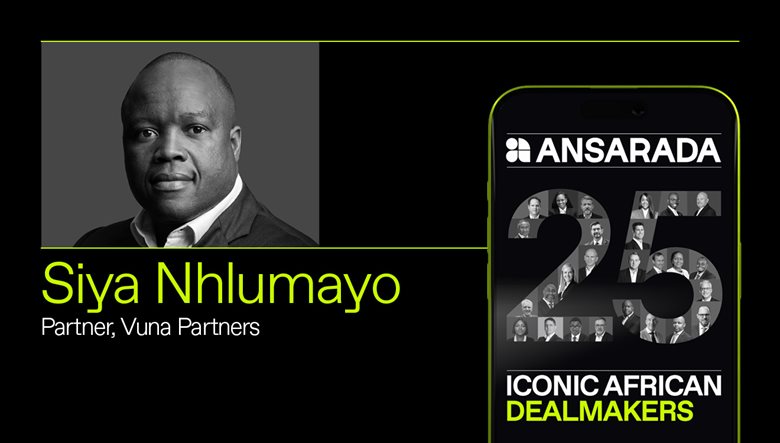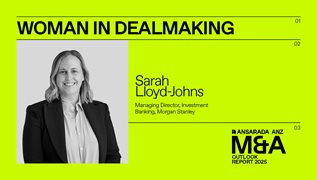Vuna Partners’ Siya Nhlumayo: The role of empathy in African private equity
Siya reflects on his journey in private equity, highlighting the critical role of empathy alongside technical expertise.
By AnsaradaTue Apr 08 2025Mergers and acquisitions, Due diligence and dealmaking, Advisors

With extensive experience in mid-market private equity, Siya Nhlumayo’s journey from PwC to Medu Capital, leading African Phoenix Investments, and now Vuna Partners, offers invaluable insights into the evolution of deal-making in South Africa across public and private markets.
In this excerpt from our 25 Iconic African DealMakers Report, Siya recounts his unconventional entry into corporate finance driven by an interest in entrepreneurship, emphasizes the paramount importance of empathy and soft skills in successful dealmaking, and shares valuable lessons learned from challenging deals and his perspective on key trends shaping South Africa's M&A landscape.
What initially drew you to corporate finance and deal‑making? Was it inspired by Wall Street and Gordon Gekko, or was there a defining moment that set you on this path?
Far from it! I’m an accountant by training. I always knew I wanted the qualification, but I didn’t want to spend my career auditing books. During my time auditing, I worked with small to medium-sized businesses, which I found fascinating. I wanted to get closer to what these entrepreneurs were doing.
That transition into M&A began with transaction services, valuations, and due diligence. It brought me closer to entrepreneurship, but it still wasn’t close enough. The next step was private equity, and in 2007, I joined a private equity fund manager.
2007 was quite a time to enter private equity, right before the global financial crisis. Over these 20 years, what core values have guided your decision‑making and leadership, especially the softer skills needed to close deals?
You’re right—the technical side is crucial, but it’s the soft skills that guarantee success. The one skill that stands out for me is empathy.
Many of us have been through multiple transactions, but for a seller or management team, this may be their first experience with a change of ownership. Empathy means understanding their position, respecting the legacy and culture of their business, and valuing the employees who will remain post-transaction.
Empathy has been central to my experience in private equity and M&A. Empathy with a capital E! When dealing with family-owned businesses or founders exiting, emotions are heavily involved.
Reflecting on your career, can you share a particularly challenging deal and the lessons you learned?
No one likes to talk about the losses, but that’s where the most valuable lessons are. I recall an investment where we lost capital. Despite our best efforts, the plan didn’t work out. The key takeaway for me was to treat each additional capital injection as a new investment.
Sometimes emotions cloud judgment, and we try to protect the capital already invested instead of making a clear, evidence-based decision. That lesson has stayed with me.
How do you navigate setbacks and maintain resilience in such a competitive and high‑stakes environment?
Discipline is key. It’s about protecting capital first before chasing upside. Effective risk mitigation strategies ensure that one loss doesn’t jeopardize the entire portfolio. When setbacks occur, transparency and engaging with multiple stakeholders for feedback is critical.
Acknowledging different perspectives helps avoid internal biases and fosters resilience. The portfolio approach in private equity spreads risk—some deals perform exceptionally, some meet expectations, and a few miss the mark.
Is there a career‑defining deal that stands out to you?
Success isn’t always measured in returns but in the relationships built along the way. The most rewarding deals are those where entrepreneurs validate their decision to partner with you, expressing gratitude for the relationship and shared growth. These relationships often continue long after the deal is done, and for me, that’s the true measure of success.
Do you stay in touch with entrepreneurs and founders after exiting a portfolio company?
Absolutely. I’m not great at marketing myself, so entrepreneurs who’ve had a positive experience with me become my best advocates. They refer peers and introduce new opportunities, which is invaluable. Maintaining these relationships makes prospecting much easier.
Over the past two decades, what key trends have shaped South Africa’s M&A landscape?
Empowerment transactions have been a significant driver in both public and private markets. Infrastructure investment has also played a key role, with public-private partnerships gaining prominence. We’ve also seen substantial activity in telecommunications, healthcare, and education.
Looking ahead, private capital markets are set to grow further as pension funds and institutions allocate more capital to private equity and venture capital.


